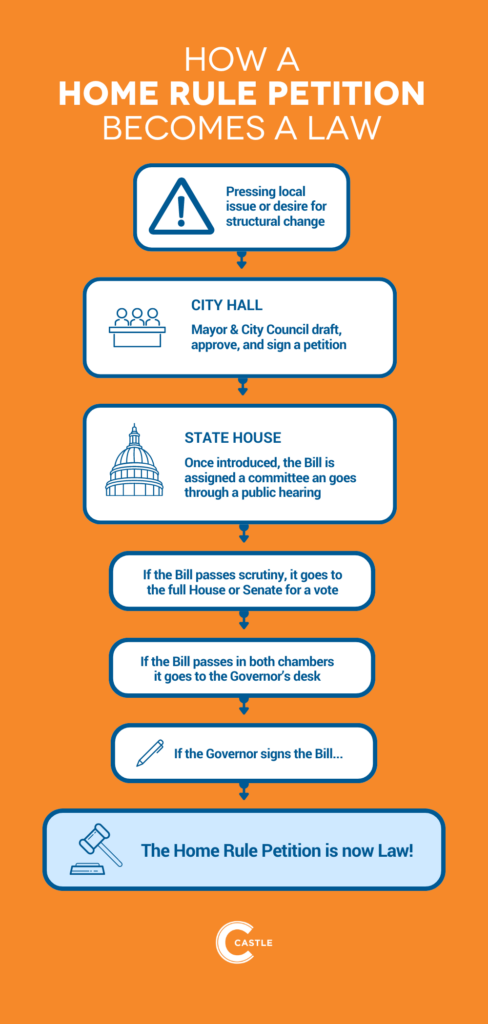With the 2023-2024 legislative session closing on July 31, headlines have covered down-to-the-wire deliberations around some of our most vexing issues. Housing, climate change, economic development, and healthcare—all huge bills that include funding, new policies, and tools to help the public and private sector progress on identified goals in each area. These bills have been, or are currently, under debate in both the House and the Senate, and if passed, then signed or vetoed by the Governor, with unique impacts for communities across the Commonwealth.
You may or may not have also noticed several bills classified as ‘Home Rule Petitions.’ This slightly different legislative tool originates with a single municipality’s local government. Still, as we are witnessing, it can have ripple effects across our communities.

What is a Home Rule Petition?
At its core, a Home Rule Petition is a formal request from a city or town to the state legislature seeking permission to enact a law that otherwise falls outside its authority. This process stems from the Home Rule Amendment to the Massachusetts Constitution, adopted in 1966, which grants municipalities significant autonomy in local affairs. However, this autonomy is not absolute; specific changes require state approval. For example, when the city wants to do something outside its legal authority, such as imposing a new tax, it must petition the state to grant permission through special legislation.
In short, this tool provides a city or town with the flexibility to solve local issues where existing laws might fall short. It is another advocacy pathway and collaborative process to find solutions.
How a Home Rule Petition Becomes a Law: Boston Edition

In the City of Boston, a Home Rule Petition is a formal request from the city government to the state legislature to enact a special law that applies only to Boston. The Home Rule Petition process starts with the Mayor and City Council drafting a petition in response to a pressing local issue or a desire for structural change. Recent examples include efforts around rent stabilization, increased liquor licenses, and the development process.
The Mayor submits the petition to the City Council, or a city councilor can introduce it. Once drafted, the petition must be approved by the Council and signed by the Mayor, demonstrating local consensus. At the State House, the bill goes through the normal legislative process assigned to a committee with public hearings that feature testimony from sponsors, community members, and advocates—and an opportunity for potential modifications to ensure no conflicts with existing law. If the petition survives that scrutiny, the committee reports, and the House and Senate vote on it. If the petition passes both chambers, it goes to the Governor’s desk for signature to become law.
If you are still reading, I commend you. It’s a lengthy and complex explanation that mirrors the typical path for a Home Rule Petition, which can often take months, years, and sometimes multiple attempts to complete.
Timely Spotlight: Boston Property Taxes
As mentioned above, home rule petitions can have impacts beyond the community proposing the change. Boston’s latest property tax proposal has sparked a heated debate among residents, the business community, industry groups, and public officials. The home rule petition, currently under consideration in the legislature, aims to restructure the city’s property tax system, potentially shifting the tax burden between residential and commercial properties.
This contentious issue has far-reaching implications for Boston residents, homeowners, businesses, and the region’s economic landscape. In a city with a high cost of living, property tax relief for Boston homeowners is welcomed. However, the other side of the coin is the potential of higher taxes for a struggling commercial real estate sector. This is against a backdrop in a region where the government is beating the drum on economic competitiveness.
Regardless of which side you fall on, the discussion has prompted a lively public debate on housing, taxes, and economic priorities that have featured public reports, trade group forums, robust local reporting, and public advocacy from both sides. This means more voices participating in the public process and opportunities to elevate your voice and priorities.
Critics argue that Home Rule Petitions undermine local control since the city is still beholden to the state legislature. Proponents counter that the petitions allow for collaboration and partnership between state and local government.
As cities like Boston evolve, the Home Rule Petition remains vital in their governance toolkit. It allows them to craft solutions tailored to their needs and visions for the future while ensuring alignment with broader state policies and goals.
Interested in more Public Affairs updates?
Subscribe to Castle communications to receive the Lit Drop, bringing nuanced insights into what is moving the needle across New England and on Capitol Hill.
Read more about our Public Affairs services here.
















